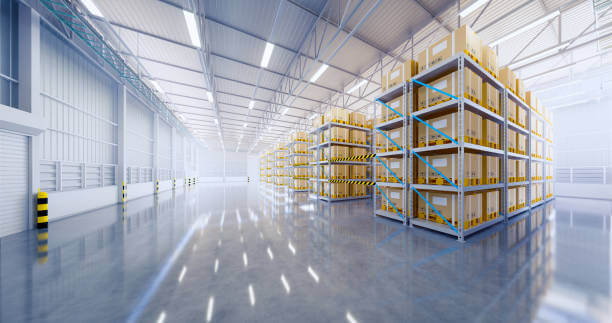Digital is not the cherry on the cake, it is the new cake.
Jean Paul Agon, Chairman of L’Oréal Group
Artificial Intelligence is already on the way to reshape retail business and the broader value chain. AI in Retail is the hottest trend in the retail business in 2020. According to Accenture, 86% of retailers have already been experimenting with AI to pave a new road to success. Moreover, the majority of surveyed companies concur that AI-powered applications will further transform financial and operational areas of retail business by providing companies with business insights, better-trained and trusted employees, as well as increased sales, empowered by real-time data and advanced analytics.
If someone still believes that AI is an innovation that can be ignored, that person is catastrophically wrong.
44% of consumers already use AI technology, such as Amazon Echo, Facebook M, and Apple Siri, as virtual assistance, whereof 86% enjoy the experience.
Furthermore, AI-driven platforms with advanced data analytics, personalized content, tailored ads, and smart engine searches, such as Uber, Google, and Facebook, have become our daily routine.
With AI already in the minds of our customers, now it is time to take advantage of this technology and the opportunities it offers for business processes
Challenges Retail Faces Today and How to Take the Most Out of AI in Retail
The retail industry is under pressure due to massive expenses on e-commerce supply chains, growing demand from suppliers, increasing customer expectations, intense competition control, overall retail margin pressure, as well as lack of workforce skills and capabilities.
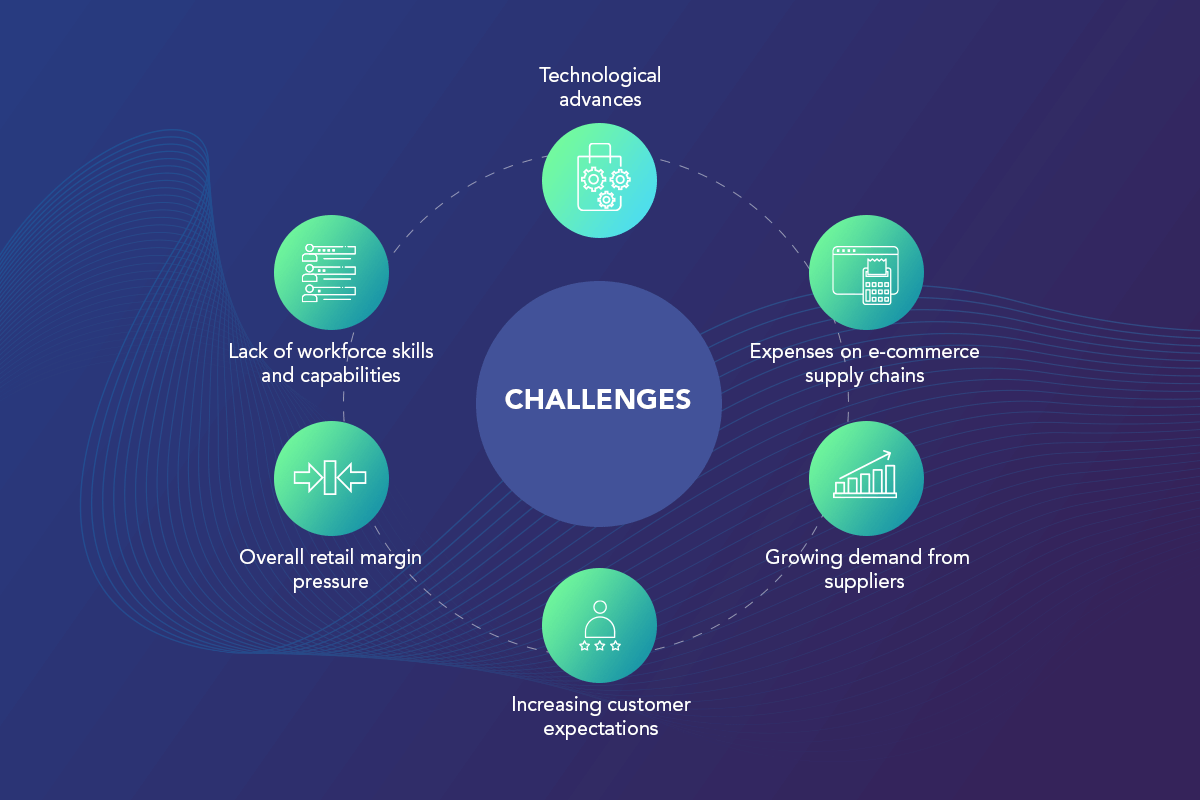
AI, with its automation capabilities, offers the broadest of cutting-edge solutions to these challenges. For instance, e-commerce can be significantly enhanced with AI and Machine Learning. Among e-commerce applications are customer-centric engine searches, advanced identification of the target audience and its needs, AI-based CRM systems, product and service personalization, virtual assistants, tailored recommendations, smart shipping, etc.
AI can help decrease costs due to savings from reduced inventory and AI-managed storage and distribution. Moreover, AI predictive analytics can be applied to supplier selection. Supplier assessments, audits, and credit scoring can be performed by AI technology, helping companies to find the right supplier, thus leading to cost reduction and company profitability.
A company without machine learning, can’t keep up with one that uses it.
Pedro Domingos, author of the bestseller The Master Algorithm
As innovations advance, customers become more sophisticated and more demanding of retailers. To keep on track and satisfy customers, retailers turn to cutting-edge solutions. Those who are not implementing AI in their business applications are falling behind. Customer-focused AI solutions, such as in-store assistance, customer satisfaction tracking, customer behavior prediction, and chatbots for customer services, help companies gain valuable insights into customer behavior and allow them to outpace competitors adhering to traditional approaches and business methods.
Another challenge faced by the retailing industry is the skilled labor shortage. According to McKinsey Global Survey on future workforce needs, nearly 9 out of 10 surveyed executives claim that their companies either face skill gaps or expect them to develop within the next five years. AI can help enable transparency and skills personalization in an expanded learning ecosystem.
The IBM Institute for Business Value defined the strategies organizations should use to maintain a skilled workforce, namely, Personalization, Transparency, and Convergence of internal and external ecosystems.
In essence, the idea is that the learning experience must be tailored to the goals of particular users or companies. Besides, it must be highly transparent, providing employees with deep visibility into skills positions across companies and into the roles that are in demand in the market. Additionally, to remain competitive, companies must adopt an open technology architecture and build partnerships, ensuring that the company takes the most of the latest technological advancements as Artificial Intelligence.
Among widely used AI applications in HR are AI-powered employee training, advanced tracking and assessment, individual skill management, and smart on-boarding.
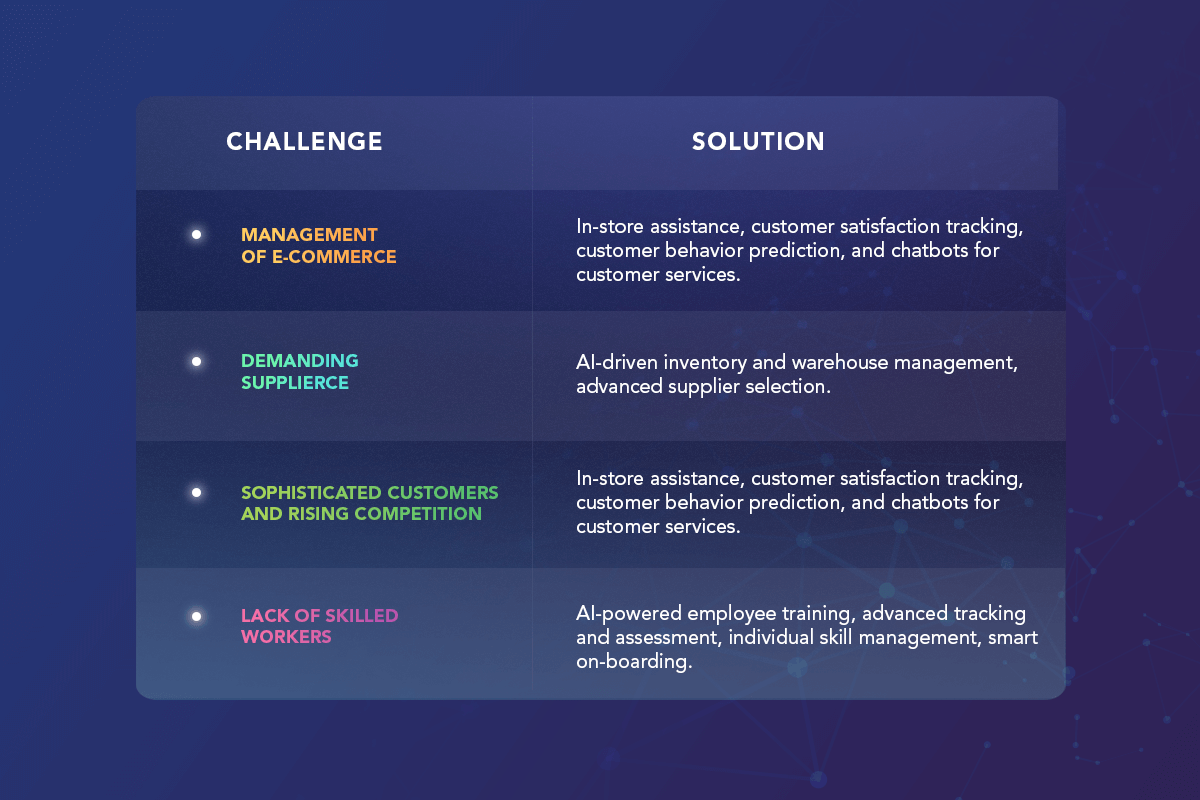
Read more about the ways AI can transform the retail industry.
AI in Retail: Top Applications
Among the top AI applications in Retail are:
- Demand Forecasting
- AI Merchandising
- Automated Inventory Management
- Product Discovery
- Customer Journey Personalization
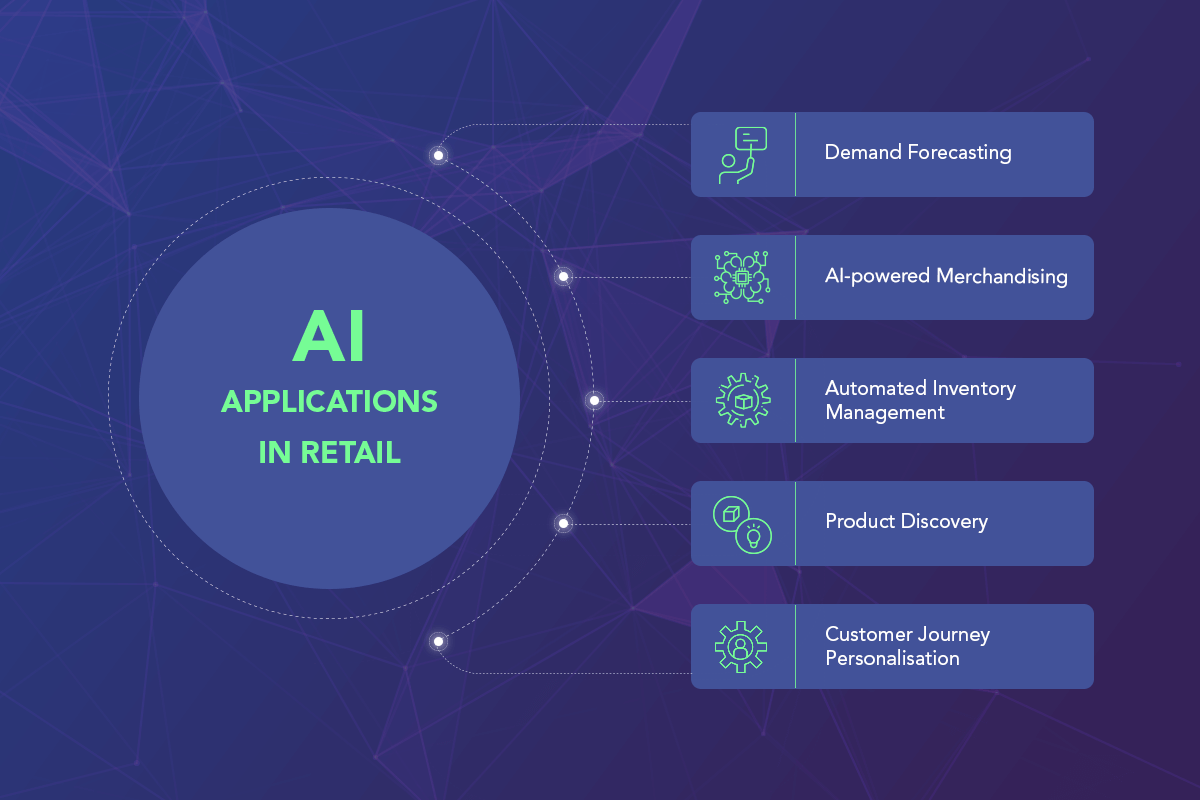
Demand Forecasting
With the ability of AI to process large amounts of data and based on forecasting analysis AI applications can make accurate predictions about customer buying behavior, thus allowing companies to accurately evaluate the likelihood of positive customer response to an ad, marketing campaign, or a product/service promotion. Moreover, predictive analysis based on data from online channels can identify the customers who are most likely to buy certain products.
AI-Powered Merchandising
According to McKinsey, merchants spend approximately two-thirds of their time collecting data and other routine tasks and only one-third of their time working on critical tasks.
AI technology can benefit Merchandising by automating routine tasks. Firstly, AI can ensure the streaming of the right variety of products via the right channel. Data analytics capabilities allow an AI system to monitor and analyze the market state and consumer preferences in real time and then dynamically adjust product assortments, marketing content, and pricing. As a result, retailers provide accurate segmentation and experiences tailored to customers’ buying patterns and preferences.
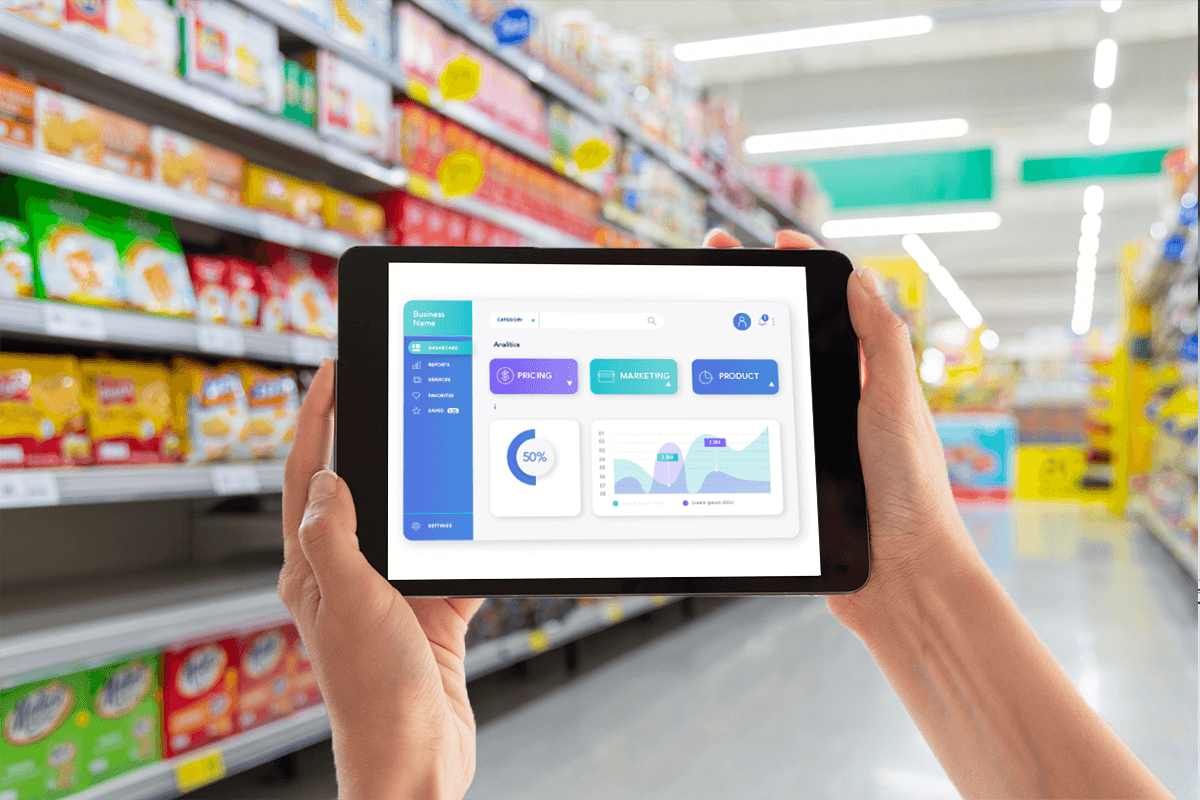
Automated Inventory Management
With AI technology, inventory management becomes more automated and less complex. The inventory management solutions provide retailers with a better view across the store inventory, eliminating waste and inefficiencies from operations. For instance, “smart shelves” can detect out-of-stock items and pricing errors. Moreover, constant real-time monitoring due to embedded computer vision in checkout systems reduces product loss.
Product Discovery
In the retail business, the key to success is speed. With ML and real-time personalization, an easy AI-driven shopping process can endear retailers to their clients, making the shopping journey more attractive, as customers who quickly find exactly what they are looking for are more likely to return to the same store.
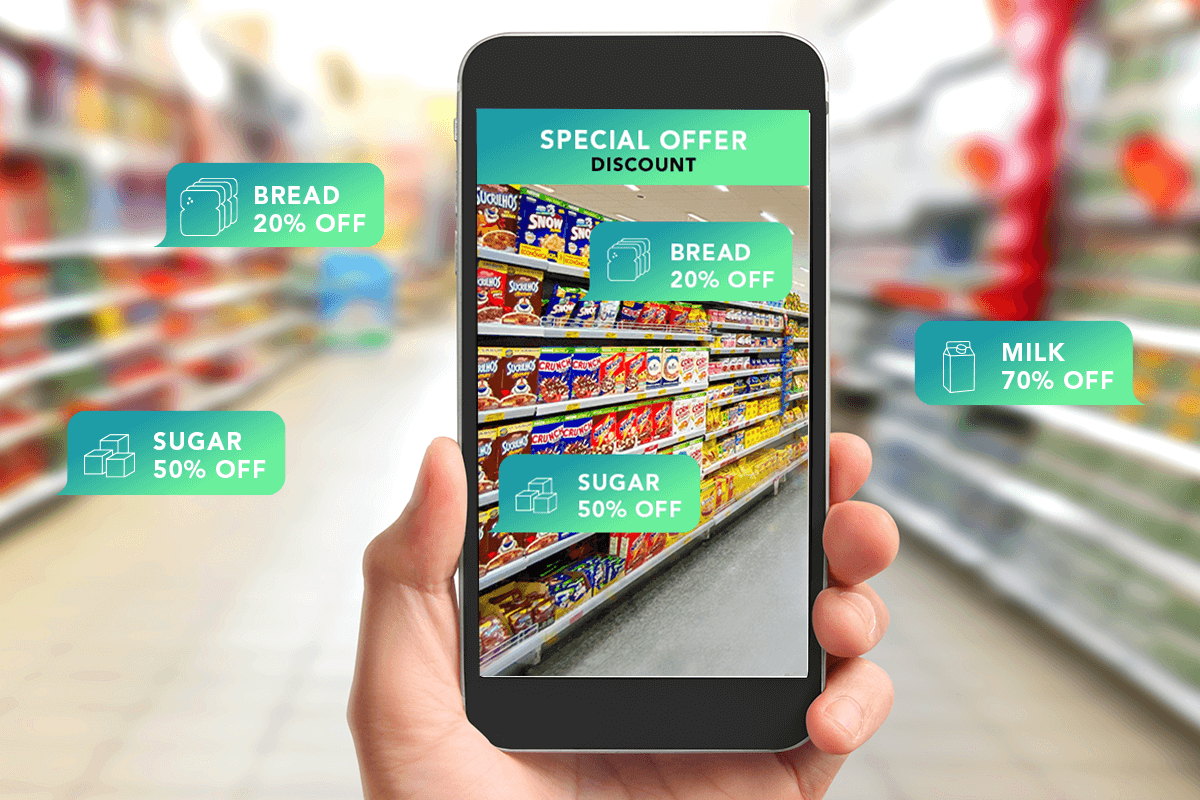
Customer Journey Personalization
Today, to successfully operate in the retail business, brands have to know their shopper, as well as the shoppers, know the brand. AI can understand the visual preferences of each client and tailor a shopping journey exclusively for each shopper. For instance, retailers can develop a style profile for each customer, with personalized content across all channels.
Product Matching
The greatest competition among modern trade segments is in the retail industry. Retail companies produce a large variety of products quickly to satisfy current customers and attract new ones. However, a significant challenge lies in product matching, as some products may be similar or even one-to-one identical to competitors’ products. This can lead to loss of customers, reputation damage, and even plagiarism lawsuits. With AI product matching systems, retailers can eliminate this pain, identifying potential duplicate product entries.
Here you can find more retail trend solutions.
Real-Life Use Cases of AI in Retail: Softengi and Watch Similarities Detection
Softengi has developed AI-driven software that allows retailers, designers, and lawyers to compare the design of watches made by different brands. Using neural networks, the software shows similarities with analogous products in percentages across five parameters: strap, dial, crown, hands, and case.
As a result, designers can check the new design before releasing the product, lawyers can easily resolve legal issues, and retailers can enhance the product offering for their buyers.
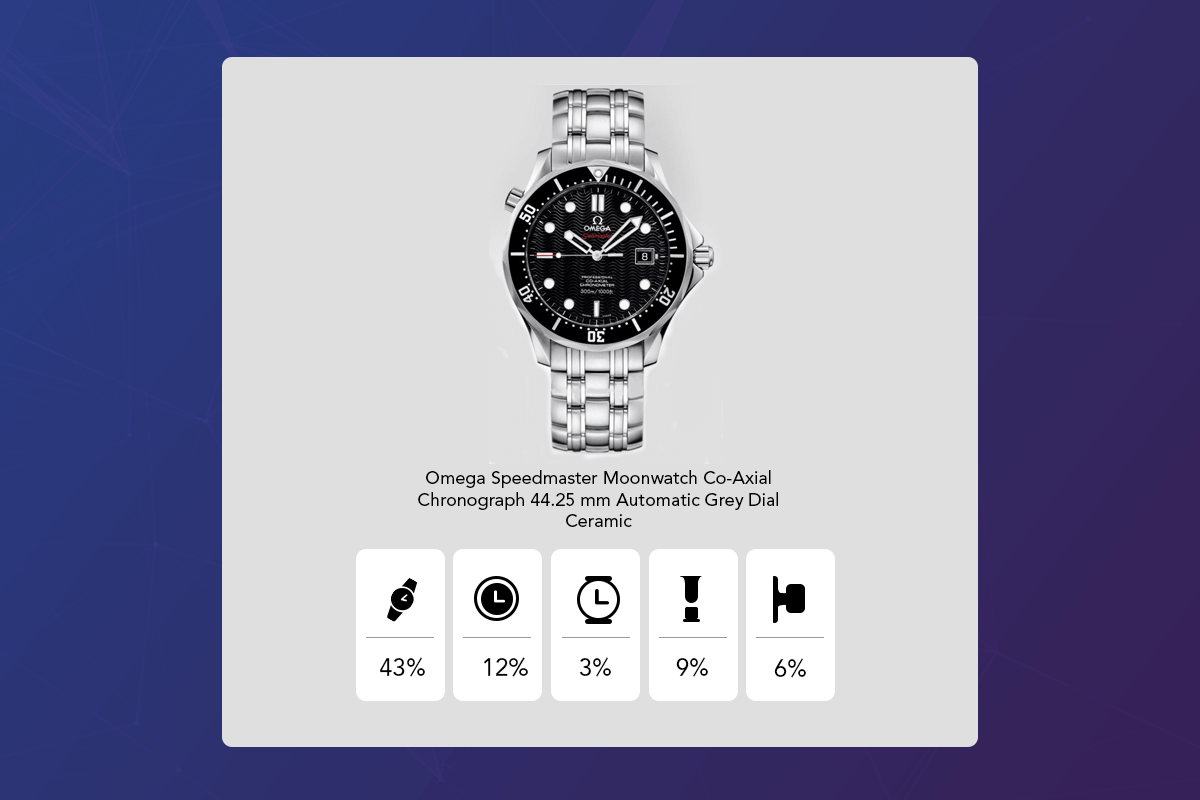
Walmart and the “Store of the Future”
Walmart exploits the full potential of AI and related technologies to provide a unique experience to its customers. Walmart has recently introduced the Retail Intelligence Lab, an AI-powered store that allows companies to manage their inventory better. A set of AI-powered cameras mounted in the ceiling can monitor inventory levels enabling the AI system to detect products on shelves, recognize the exact type of the product and its amount and compare quantities on shelves with upcoming sales demand.
Kroger and Digital Shelves
America’s largest grocery chain, Kroger applies AI to provide its customers with an engaging shopping experience. by making highly personalized offers to customers as soon as they approach a digital display. In essence, when a buyer walks down the aisle with a Kroger app open, sensors identify the user, highlight products the customer might be interested in and offer tailored pricing.
Read more about smart shelves and AI-powered quality control.
HEMA and AI-Powered Supply Chain
The Dutch retail chain HEMA embraced AI for its supply chain management. With AI, HEMA forecasts product demand by analyzing metrics such as weather, current promotions, national holidays, day of week/month/year, etc. The AI system estimates probabilistic demand predictions, including business impact and operational risks, enhances the initial buying journeys, and improves vendor collaborations. Besides, it provides better supply chain visibility with accurate forecasting of inventory, purchases, warehouse flow, and transport demand.
Benefits of AI in Retail
Among the main benefits of implementing AI into retail business are:
- Productivity
- Visibility
- Workforce Satisfaction
- Customer Satisfaction
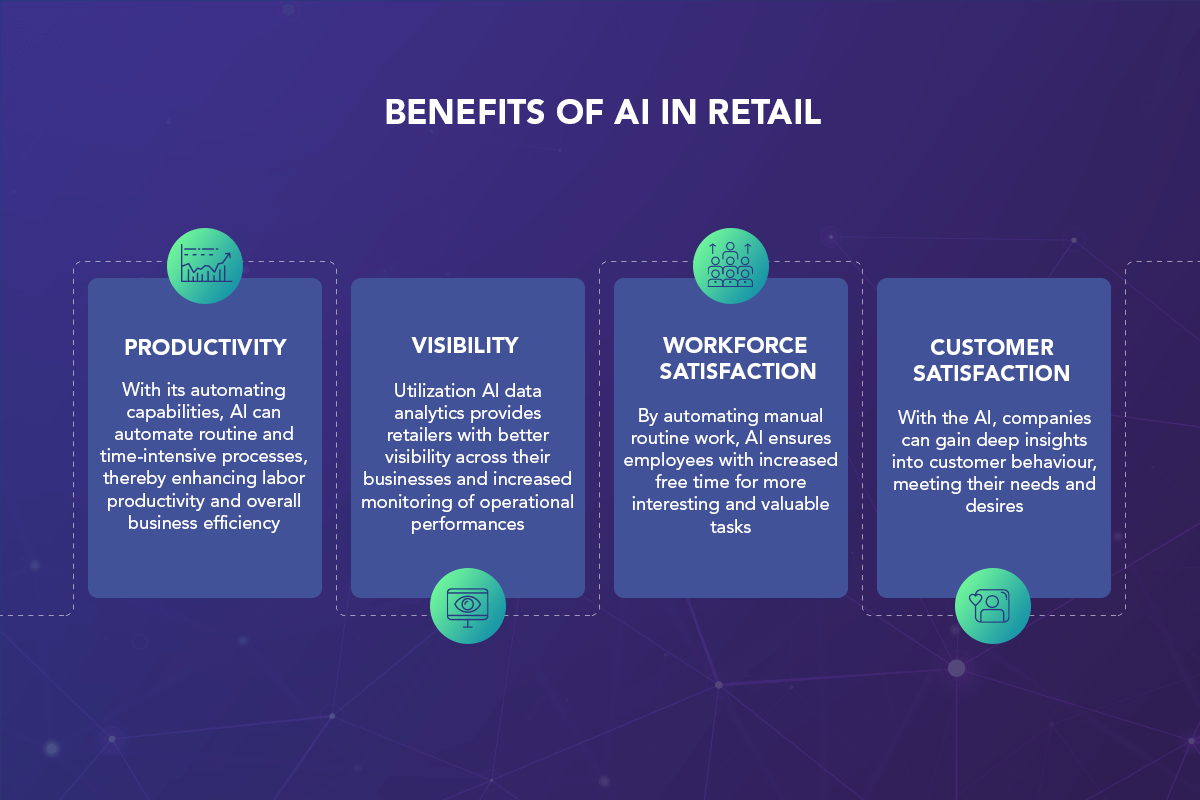
Productivity
Augmenting the workforce with AI significantly enhances labor productivity and overall business efficiency. With its automating capabilities, AI can automate routine and time-intensive processes, thereby supporting and bolstering margins. Moreover, in-depth analysis of various data help open up new revenue channels and accelerate go-to-market time.
Visibility
Using AI data analytics and increased monitoring of operational performances provides retailers with better visibility across their businesses. AI retail systems offer end-to-end visibility of the stock purchased from suppliers, stock on hand, current margins, and market trends observed over a specific period.
Workforce Satisfaction
With AI, employees experience increased engagement in their work, therefore delivering better results from their job performance. By automating manual routine work, AI provides employees with increased free time for more interesting and valuable tasks.
Customer Satisfaction
With the ability of AI to analyze vast amounts of internal and external data, companies provide deep insights into customer behavior, preferences, and current needs. As a result, retailers can offer customized products and tailored service ranges to each client.
Moreover, an AI system allows retailers to analyze customer experience more efficiently, promoting brand loyalty and customer retention. Social media and CRM systems offer large amounts of information that offer insights into potential obstacles in the current customer journey, leaving users with a chance to minimize or eliminate them.
Final Word
IF YOU WANT TO KNOW MORE, DOWNLOAD OUR FREE WHITE PAPER
Digital Transformation in Retail is all about automation and personalization. Artificial Intelligence, with its analytics and prediction capabilities, offers the retail industry a great number of opportunities that help to enhance operational efficiency, attract new customers, and generate sales.
In today’s highly competitive retail business, AI, with its ability to predict what consumers will buy or when, where, and how they will purchase, can give companies an edge over their competitors. Moreover, with Machine Learning, AI systems can automate various routine tasks, providing more agile ways of working that allow for increasing operational efficiency.


